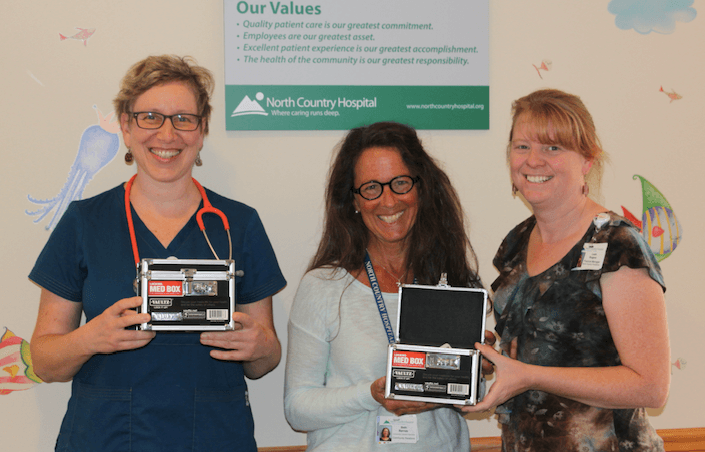NEWPORT — Over 59,000 children visit an emergency room for medicine poisoning every year. That’s one child every nine minutes.
Sales for over-the-counter medications went from $5.5 billion in 1980 to $30.8 billion in 2014. As these numbers explode this means that children are increasingly exposed to prescription drugs and equally dangerous over-the-counter medications.
Beth Barnes, Community Outreach Specialist at North Country Hospital, was recently asked if the hospital could supply lock boxes where medications and other potentially hazardous items could be safely stored.
“The same night this request was made I was watching PBS and saw Stephen Ubl being interviewed by Judy Woodruff,” Beth said. “Since I had no grant money for medication lock boxes I wrote to Mr. Ubl, president and CEO of the Pharmaceutical Research and Manufacturers of America and asked if he could help.”
Less than a week later, one of Mr. Ubl’s Directors responded to say that PhRMA would donate enough money to buy almost 400 boxes that could help local families.
Working with the Vermont Department of Health’s Newport office, the boxes will be given to local pediatric practices and NEK Human Services to distribute as needed. These boxes will help to prevent the risk of overdoses or poisonings.
Here are some of the ways families can also safeguard their homes against accidental poisonings, overdoses, and medication mishaps:
Put all medicine and vitamins out of sight and out of reach of children of all ages.
Close medicine caps tightly after every use and choose child-resistant caps for medicine bottles when you can. Remember that child-resistant doesn’t always mean childproof.
Be alert to visitor’s medicines. Offer to put purses, bags, and coats out of reach of children.
Remember to ask people where your child visits to also store their medications safely even if it seems socially awkward.
Put medications up and away after every use even if it is tempting to leave it out in preparation for the next dose.
Keep close track of when doses are given so they are not repeated prematurely.
Write detailed instructions to caregivers and babysitters and remind them to store the medications out of sight and out of reach.
Get rid of unused or expired medications. Locally, the Newport Police Department will take back medications 24/7.
This is not a complete list of how people can protect their homes but it is a great place to start. “The most important phone number any adult can have programmed into their phone is the National Poison Control number,” Beth said.
That number is 1-800-222-1222.

